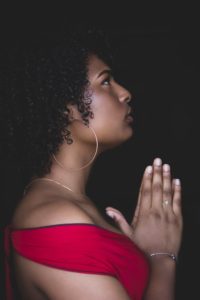By A. Helwa
“Bow down in adoration and draw closer to Allah.” (Qur’an 96:19)
“Verily, when a servant stands to pray, his sins are placed on top of his head and shoulders.
Every time he bows or prostrates, they fall away from him.” (Prophet Muhammad, peace be
upon him)
The more we humble our egos and turn away from the illusion of separation, the closer we get to unveiling the all-encompassing oneness of Allah. When we turn down the chaotic voices of the mind, tuning instead into the gentle presence of God in the heart, we are better able to hear the continuous stream of God’s guidance. This is why the soul of the prayer is said to be in the position of prostration, because it is the only position in which the heart is elevated above the mind, reigning as the conscious king of the body. When we prostrate, the head is lower than the heart, making blood and oxygen flow to the brain more effortlessly, which research has indicated may help relieve stress and depression. Despite the spiritual importance of prostration, the salat does not begin with a posture of effacement, but rather begins in the standing position. This position is a reminder that one day we will all stand before God, and that as human beings we have the propensity to be arrogant and to position ourselves above those who are smaller in stature and status. Allah created us not to stand above the rest of creation, but to stand in humble service of all sentient beings for the sake of Allah.
As we stand and recite the holy verses from the Qur’an, the weight of revelation naturally draws us into a bowing position. We bow with our hands on our knees and our backs straight, staring at the space between our feet. Whereas when we were standing our gaze could reach as far as the horizon, when we bow we are humbly reminded that, as vast as the Earth is, we only occupy the small space beneath our feet. We are reminded that we do not own this Earth and our time upon it is short and fleeting. When we bow, we remind ourselves that the spiritual path begins exactly where we are, that all spiritual growth begins by first acknowledging and addressing our own pride, faults, and judgments. As we bow, our earthly crowns of wealth and influence fall, reminding us that everything we have is but a loan from God. Once we acknowledge how vulnerable and needy we are for God, we stand again, with a new- found humility and appreciation for our place in the universe.
Now, we stand not in arrogance, but as a servant of God. From this position of servitude, we then descend into the holy station of prostration. The first time we prostrate and put our head upon the earth, we are humbly reminded that we come from the very dirt we walk upon. With our heads pressed upon the ground, we are reminded that had God not blown His breath into us we would be nothing but dead earth—void of life and consciousness. From here, from our lowest depths, from the very soil of our humble creation, the seeds of true sincerity and faith begin to blossom.

When we rise up from the fetal position of prostration to the sitting position, we are reminded of how God pulled us out of the earth and gave us life. Like a seed that grows into a flower, we sit above the ground and appreciate the life we have been given. And just as every flower will eventually wilt and give her petals to the earth that once nurtured her into being, we return to the earth for our second prostration. Where the first prostration represented our creation through the earth, the second prostration represents our return to the earth through death. Although the second prostration symbolizes the end of our earthly life, it is not the end of the salat. After this prostration, we then rise into the second cycle of prayer by returning to the standing position. We stand again as a reminder that death is not our end, but that one day we will all be resurrected from our graves and called to stand before God to answer for the choices that we made. Although on Earth injustice may prevail, on the Day of Judgment all wrongs will be made right. Salat actively confronts every illusion that this world tries to sell us as truth.
When we engage in prayer and turn to God, we are simultaneously turning our backs on racism, sexism, and bigotry. Standing up for God means standing up against everything that does not honor the priceless value of human life and the holiness of the human spirit. The spirit of salat is not meant to be limited to the dimensions of our prayer mats. The salat is meant to encourage us to be more caring, to stand up against oppression with our words and our actions, and to open the path to divine love for all people who seek it.

This blog is an excerpt from A. Helwa’s recently published best-selling book, “Secrets of Divine Love: A Spiritual Journey into the Heart of Islam.” Her book is available on Amazon.com
#1 Best Seller
About A. Helwa
A. Helwa believes that every single person on Earth is deeply loved by the Divine. She is a writer who has inspired hundreds of thousands of readers through her passionate, poetic, and love-based approach to spirituality. Her popular blog @quranquotesdaily, was established while obtaining her Masters in Divinity, as a means of helping others overcome personal and spiritual struggles on their journey of experiencing divine love.
With over 15 years of experience writing and speaking on Islam and spiritual development, A. Helwa draws from her personal experiences and traditional sources to help her readers access ‘Divine love in everyday life.’

